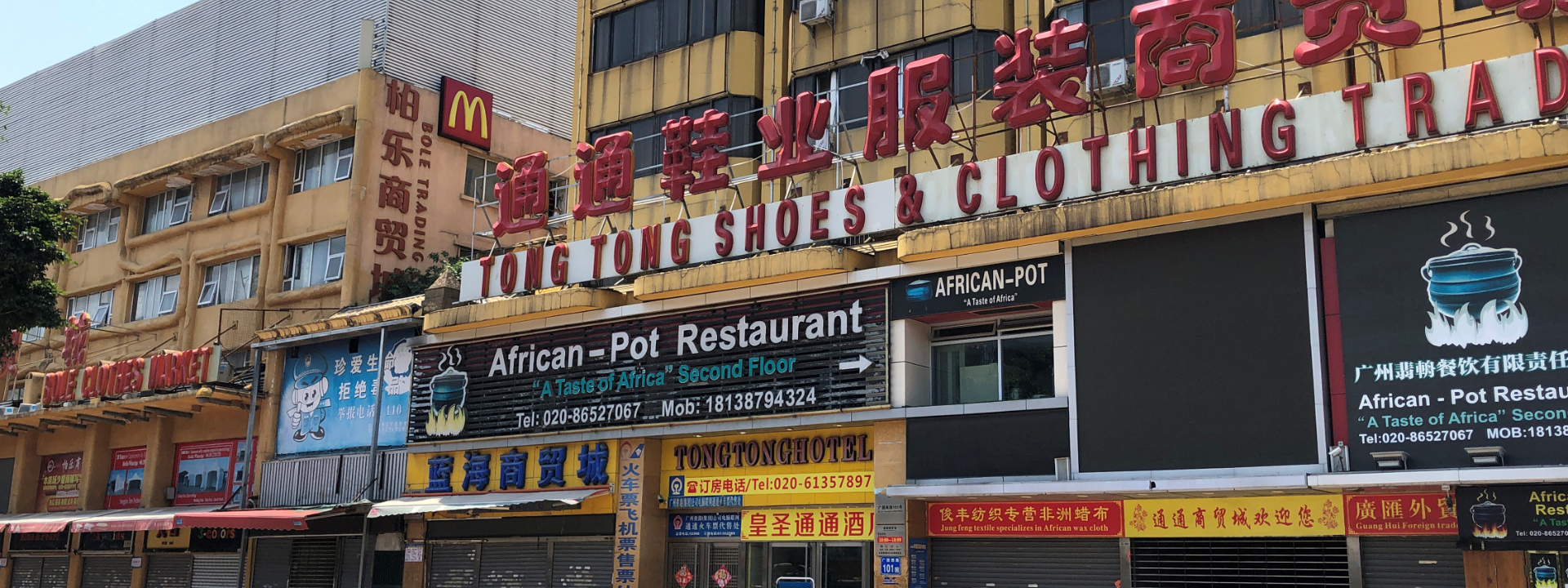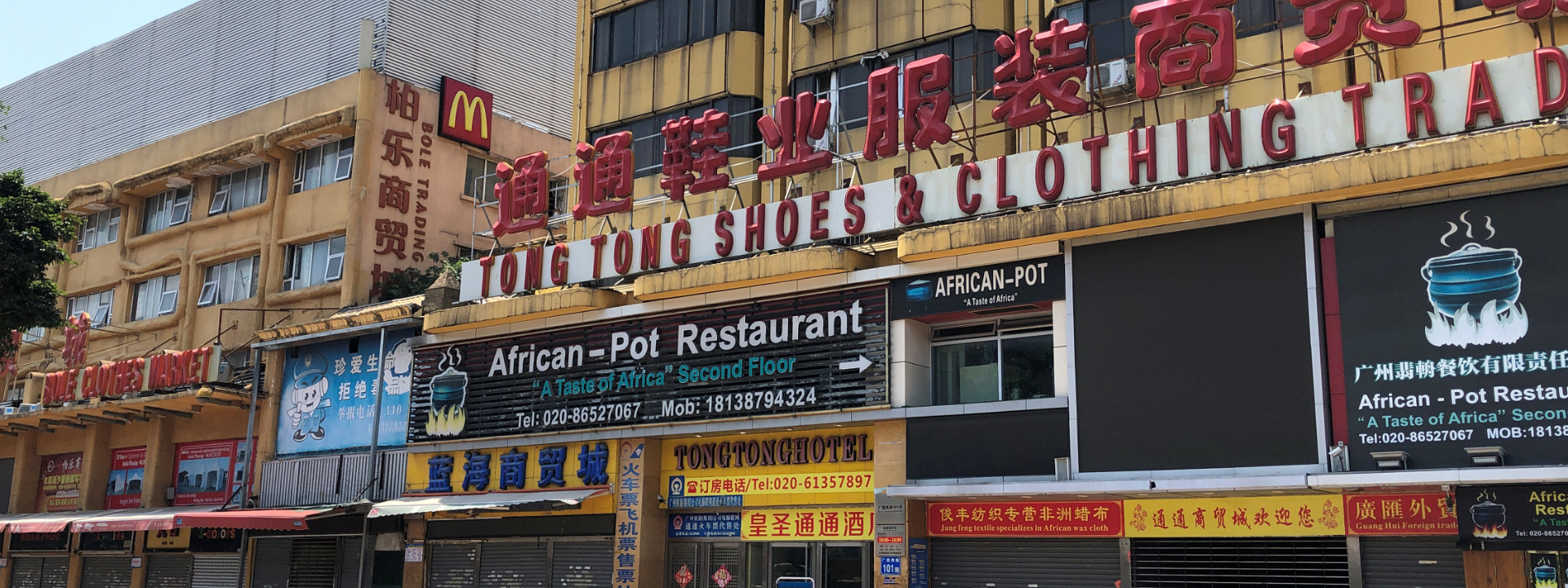
The official Chinese response to accusations of racial discrimination shows a deliberate attempt to gloss over the question of race by obfuscating facts

As part of our effort to broaden expertise and understanding of information ecosystems around the world, the DFRLab is publishing this external contribution. The views and assessments in this analysis do not necessarily represent those of the DFRLab.
On April 10, 2020, a slew of videos of African nationals being forcefully evicted from their homes and hotels by hotel managers, landlords, and local authorities in Guangzhou, China, began going viral on social media outside China. These evictions were part of a campaign launched by local officials in Guangzhou to test and quarantine anyone with “African contacts,” regardless of recent travel history or contacts with patients with COVID-19. Local police have also advised restaurants to turn away customers of African origin. These racially discriminatory policies, issued after five local Nigerian men tested positive for coronavirus, quickly sparked international outrage. Both foreign governments and journalists have accused China of discriminatory acts against a vulnerable, often transitory population, yet China’s official response to these accusations of discrimination has been one of denial, obfuscation, and justification.
Initially, the Chinese government issued a blanket denial of any alleged discrimination against and mistreatment of African nationals. Foreign Ministry spokesman Zhao Lijian claimed that China treats “all foreign nationals equally.” China Global Television Network (CGTN), China’s state-owned international broadcaster, stressed that the policies in Guangzhou were “nationality-blind.”
Meanwhile, the Chinese Embassy in South Africa tweeted that “there is no such a thing as the so-called ‘discrimination against Africans in Guangdong Province.’” At the same time, CGTN has produced videos of Nigerian nationals in Guangzhou claiming that they “trust the Chinese government” and “have never experienced racism.”
Chinese media also employed a strategy of accusing outside forces of intentionally exaggerating the situation. State-owned newspaper The Global Times repeatedly claimed that coverage of the Guangzhou crisis is a “Western trap,” a concentrated effort on the part of Western media outlets to sabotage Sino-African relations. After the U.S. government issued warnings about Chinese racism directed towards African Americans living in Guangzhou, Spokesman Zhao lashed out, saying it was “irresponsible and immoral for the U.S. to sow discord,” and that any attempt to “drive a wedge between China and Africa will never succeed.”
Videos appearing on social media show people of African descent being left homeless and refused service at restaurants. Widespread reports confirmed mandatory quarantine even for those who already tested negative. Despite denials and diversions falling flat in the face of such accumulating evidence, Chinese officials continued to justify their treatment of African nationals, arguing that local authorities were simply prioritizing containment operations over optics. Chinese state media repeatedly cited a widely reported incident in which several Nigerians who tested positive for COVID-19 were frequent visitors to a restaurant where the owner also tested positive to explain the targeting of local African communities.
Nigerian foreign minister Geoffrey Onyeama, in a video widely circulated by Chinese state media and ambassadors on Twitter, denied allegations of racism in Guangzhou by stating that the Chinese government’s measure was solely a response to those five discovered cases. On April 14, Guangzhou officials stated that out of the 4,553 Africans tested for COVID-19, 111 of them were infected. This story was widely circulated by state-owned outlets; soon, the hashtag #111AfricansInGuangzhouInfected trended on Chinese social media as a torrent of online virulence called for the deportation of “illegal migrants from Africa.”
Social media misinformation has been a constant throughout this crisis, perhaps providing context for the Chinese’s government’s actions. At the beginning of April, articles with unsubstantiated claims like “Infections Exploded Between Africans in Guangzhou” and “300k+ Africans infected in Guangzhou,” went viral on the Chinese internet. The controversy sparked by these stories was so fierce that officials in Guangzhou had to clarify that Guangzhou does not have hundreds of thousands of African residents. Anti-African sentiment found support in academia as well, as Jin Canrong, a Renmin University professor of international relations, said that “Guangzhou has over 200,000 Africans, and only 14,000 of them are in China legally.” The number of Africans in Guangzhou has long been a contentious question, and Jin did not cite any sources for his statistics. It is true, however, that visa overstayers constitute a significant portion of the African population in Guangzhou, as Roberto Castillo, a professor at Lingnan University and an expert on the African population in Guangzhou points out. Because many of these African expats do not possess legal documentation which would allow city officials to properly track their health status, these foreigners might appear a public health risk to local officials attempting to contain the virus.
Besides stamping out false information online, China also maintains the official stance of not tolerating racist remarks. Chinese social media outlets have followed suit, as micro-blogging platform Weibo shuttered 180 accounts for “inciting discrimination.” Despite this action, there has been no consistent effort on behalf of the Chinese government to eliminate or censor racist or nationalist remarks made online. And the Chinese government still chose to gloss over the issue of race in its response: after lifting the previously discriminatory policies, the official Chinese stance shifted to claiming that the whole incident was the result of “a lack of communication” between overly zealous local officials and African nationals, resulting in the heavy-handed response in Guangzhou.
China’s narrative, one consisting of denial, accusations of conspiracy, and justification, paints the Chinese government, at both the local and national level, as impartial to foreigners and responsible to Chinese citizens. Yet despite the Chinese government’s efforts to stop the spread of the coronavirus and stem the tide of rumor-mongering and conflict, its media response to the crisis in Guangzhou shows a deliberate attempt to gloss over the question of race by obfuscating facts.
Celine Sui is a U.S.-based freelance journalist focused on Sino-African relations.
Follow along for more in-depth analysis from our #DigitalSherlocks.

